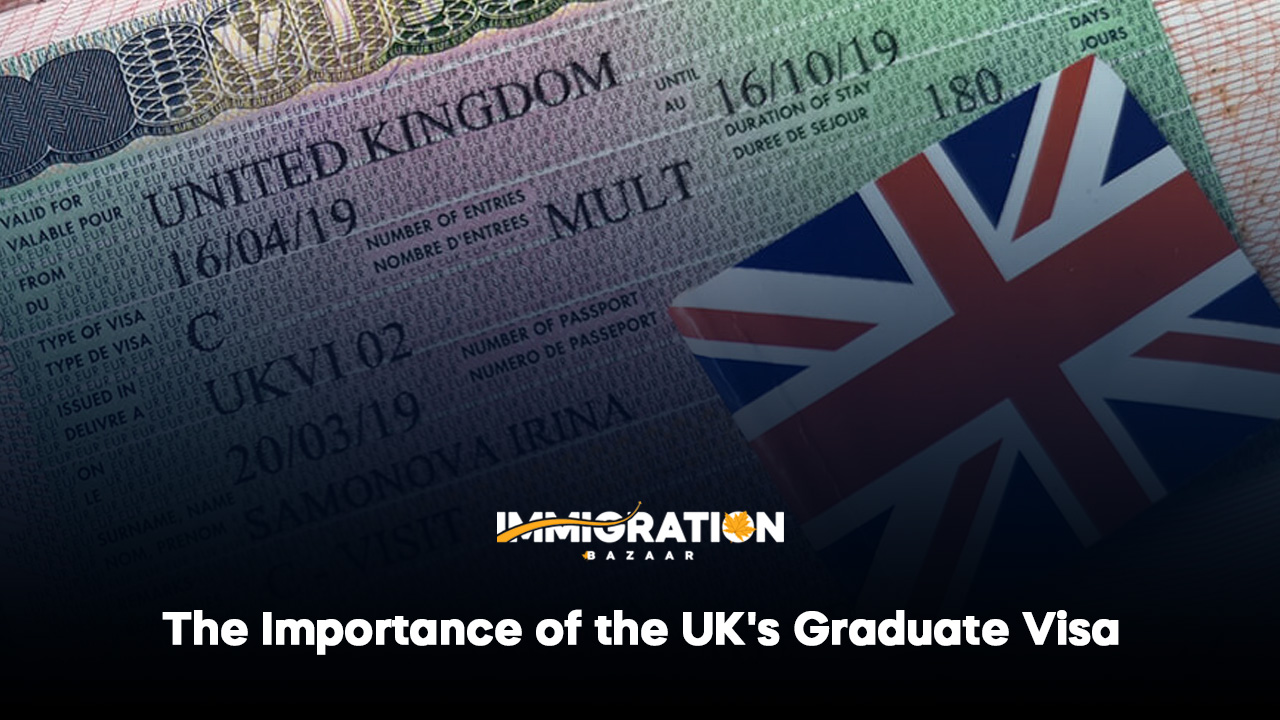In recent years, international student mobility has become a significant driver of educational and economic growth for many countries. The United Kingdom, with its world-renowned universities, has been a key destination for students from across the globe. One of the major incentives for international students to choose the UK as their destination has been the Graduate Visa (previously known as the Post-Study Work visa).
This visa allows international students who have completed their degrees in the UK to stay and work in the country for up to two years (or three years for Ph.D. graduates) after graduation. The opportunity to gain work experience in the UK has been a strong draw for students looking to advance their careers globally.
However, recent reports have sparked uncertainty surrounding the future of the UK’s Graduate Visa. While the Migration Advisory Committee (MAC) recommended the continuation of the Graduate Visa, there are indications that UK Prime Minister Rishi Sunak is considering placing restrictions on the scheme. This potential change has led to significant opposition from within the government itself, as well as from student organizations and universities.
Many fear that if restrictions are placed on the Graduate Visa, the UK will lose its competitive edge as an attractive destination for international students. In this article, we will delve into the ongoing debate around the UK’s Graduate Visa, explore its importance for international students, and analyze the potential impacts of any restrictions on the scheme.
-
The Importance of the UK’s Graduate Visa
The Graduate Visa was introduced as part of the UK’s efforts to attract and retain international students. Prior to its reintroduction in 2021, the UK had phased out its previous Post-Study Work visa in 2012, a move that many critics believed negatively impacted the UK’s ability to compete with other countries such as Australia, Canada, and the United States in attracting top talent from around the world. The decision to bring back the Graduate Visa in 2021 was seen as a positive development, aimed at making the UK a more appealing destination for international students. Here are several reasons why the Graduate Visa is vital:
-
a) Attracting International Students
International students contribute significantly to the UK’s economy. According to a 2021 report from Universities UK International, international students contribute approximately £28.8 billion to the UK economy every year. Beyond their direct financial contribution, these students also enrich the academic and cultural life of universities, fostering a more diverse and globally engaged learning environment.
The Graduate Visa has been a key selling point for UK universities when recruiting international students. It allows students to gain valuable work experience after their studies, giving them a return on their investment in education and helping them build their professional careers. Without the option of post-study work, many students might choose to study in other countries that offer more flexible visa options.
-
b) Enhancing the UK’s Global Reputation
The UK has long been seen as a leader in higher education, with several universities consistently ranking among the best in the world. However, as the global landscape for higher education becomes more competitive, policies like the Graduate Visa are critical for maintaining the UK’s reputation as a top destination for international students. By offering students the chance to stay and work after graduation, the UK demonstrates its commitment to supporting its graduates and helping them transition into the workforce, which, in turn, strengthens its global standing.
-
c) Bridging the Skills Gap
The Graduate Visa also helps address skills shortages in the UK labor market. Many sectors, including healthcare, technology, engineering, and finance, face a shortage of skilled workers. International graduates, particularly those in STEM (Science, Technology, Engineering, and Mathematics) fields, are highly valuable assets to the UK economy. By allowing these graduates to stay and work, the UK can tap into a pool of highly skilled individuals who can help fill critical gaps in the workforce.
-
The Migration Advisory Committee’s Support
The Migration Advisory Committee (MAC), an independent body that advises the UK government on migration policy, has recommended that the Graduate Visa be continued. The MAC recognizes the economic and social benefits that international students bring to the UK and argues that the Graduate Visa plays a crucial role in attracting this talent.
In its recommendation, the MAC emphasized that international students contribute positively to the UK in several ways. Not only do they help support the financial sustainability of universities through tuition fees, but they also contribute to the local economy through living expenses and other expenditures. Moreover, the MAC noted that international graduates who stay on after their studies often go on to fill important roles in sectors experiencing labor shortages, thereby benefiting the UK economy as a whole.
-
Concerns Over Potential Restrictions
Despite the MAC’s support, there have been reports that Prime Minister Rishi Sunak is considering placing restrictions on the Graduate Visa. The rationale behind these potential restrictions is linked to broader concerns about immigration levels in the UK. With immigration being a politically sensitive issue, some policymakers are pushing for stricter controls on immigration, including limiting the number of international students who can stay in the UK after their studies.
There are several possible restrictions that could be imposed on the Graduate Visa. These include reducing the length of time graduates can stay in the UK after their studies (currently two years for most graduates and three years for Ph.D. students), restricting the types of jobs graduates can apply for, or imposing salary thresholds that would make it harder for graduates to secure work in certain fields.
-
Opposition from Within the Government
The idea of restricting the Graduate Visa has faced significant opposition, even from within the government. Some ministers have voiced concerns that placing limits on the Graduate Visa would be a short-sighted move that could harm the UK’s long-term interests. They argue that international students are a vital part of the UK’s higher education system and that restricting their ability to stay and work after graduation would deter many prospective students from choosing the UK as their study destination.
One of the most vocal critics of potential Graduate Visa restrictions has been the UK’s education sector. Universities and student organizations have been lobbying the government to keep the Graduate Visa in its current form, arguing that it is essential for maintaining the UK’s competitiveness in the global higher education market.
-
Impact on UK Universities
UK universities are already feeling the pressure from global competition. Countries like Canada and Australia offer generous post-study work options for international students, making them increasingly attractive destinations for students from countries like India, China, and Nigeria. If the UK were to impose restrictions on the Graduate Visa, many universities fear they would lose out on talented students who would otherwise have chosen to study in the UK.
International students are an important source of revenue for UK universities, particularly in light of ongoing funding challenges. Universities rely on the higher tuition fees paid by international students to support their budgets and maintain their academic and research programs. A decline in international student numbers could have significant financial implications for many institutions.
In addition to the financial impact, UK universities are concerned about the potential loss of academic talent. International students contribute to the diversity of perspectives and ideas on campus, enriching the academic experience for all students. They also often pursue research in cutting-edge fields, helping to drive innovation and scientific discovery. If restrictions on the Graduate Visa discourage international students from coming to the UK, the country could miss out on these valuable contributions.
-
Concerns from Student Organizations
Student organizations have also been vocal in their opposition to potential Graduate Visa restrictions. Many international students come to the UK with the expectation that they will be able to stay and work after completing their studies. The Graduate Visa offers a pathway for them to gain valuable work experience, which can be crucial for advancing their careers, whether they choose to stay in the UK or return to their home countries.
If the Graduate Visa is restricted, student organizations fear that international students will feel misled or undervalued. This could lead to negative perceptions of the UK as a study destination, ultimately driving prospective students to look elsewhere.
-
Global Competitiveness in Higher Education
The global higher education market is becoming increasingly competitive, with countries vying to attract the best and brightest students from around the world. In recent years, countries like Canada and Australia have emerged as strong contenders, offering attractive post-study work options and pathways to permanent residency for international students.
Canada, for instance, allows international students to stay and work for up to three years after completing their studies through the Post-Graduation Work Permit (PGWP) program. Furthermore, Canada offers clear pathways to permanent residency, making it an appealing option for students who want to build their lives and careers in the country.
Australia offers similar incentives, with international graduates being able to stay for up to four years (depending on their qualifications and the region where they studied) through the Temporary Graduate visa. Like Canada, Australia also has pathways to permanent residency for graduates.
If the UK were to impose restrictions on the Graduate Visa, it risks falling behind in this global race. International students are increasingly choosing study destinations based not only on the quality of education but also on the opportunities available to them after graduation. If the UK no longer offers the same level of post-study work opportunities as its competitors, many students may choose to study elsewhere.
-
Potential Consequences of Graduate Visa Restrictions
If the UK government moves forward with restrictions on the Graduate Visa, the consequences could be far-reaching. Some of the potential outcomes include:
-
a) Decline in International Student Numbers
International students often choose the UK because of the high-quality education and the opportunity to stay and work after graduation. Restrictions on the Graduate Visa could make the UK a less attractive destination, leading to a decline in international student numbers. This would not only affect universities financially but could also result in a loss of talent and diversity on UK campuses.
-
b) Negative Economic Impact
International students contribute billions of pounds to the UK economy through tuition fees, rent, and living expenses. A decrease in international student numbers could have a negative economic impact, particularly on university towns and cities that rely heavily on student spending.







